Gravel pit defenders in Granby make case

The proposed site of a gravel pit off Trompke Avenue in Granby as seen facing east over Batchelor Brook. GAZETTE FILE PHOTO
|
Published: 04-09-2024 2:31 PM
Modified: 04-09-2024 4:04 PM |
GRANBY — David Trompke grew up walking and riding his bike down Bachelor Street back when five gravel pits were in operation.
Now, at 75, the lifelong Granby resident whose family developed a subdivision off Trompke Avenue wants to lease 19 acres for a new gravel pit, just as the last of the five earlier ones begin to run out of earth to harness.
“There were no problems with all these gravel pits and those trucks operating on Bachelor Street,” Trompke said. “There has never been an accident in this town involving a dump truck and a pedestrian or a bicyclist.”
Trompke’s plan to lease the family’s land to LJ Development, a septic system company based in Belchertown that wants to operate the proposed new gravel pit, is generating controversy between residents of nearby neighborhoods who both support and oppose the project.
LJ Development is seeking a special permit from the town’s Select Board to remove 40,000 cubic yards of gravel and sand per year. While the permit must be renewed yearly, the company had previously presented an eight-year plan to remove 292,000 cubic yards of sand and gravel from the 19-acre plot. The first phase would extract 124,000 cubic yards of material from 5.8 acres on the site over the course of three years, and the second phase will remove 168,000 cubic yards of material from 13.2 acres over five years.
On April 1, Granby residents once again packed the Senior Center to discuss the special permit. Only this time, some Trompke Avenue residents and the applicants defended the gravel pit, asserting that the project abides by the town’s bylaws and does not pose a safety risk to townsfolk.
“I don’t ever recall hearing machinery or any heavy equipment running in the background. Basically it has never really come to mind that there is actually a gravel pit operating within walking distance from my house,” Trompke Avenue resident Dave Bassette said.
Those who oppose the project remained unconvinced that the operation will not permanently damage the surrounding ecosystem and residential environment.
Article continues after...
Yesterday's Most Read Articles
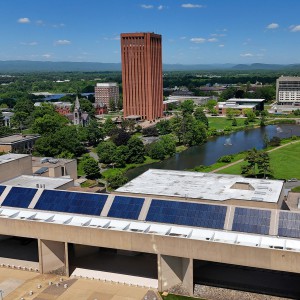 Five UMass Amherst students have visas, student status revoked
Five UMass Amherst students have visas, student status revoked
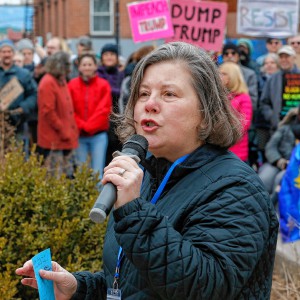 State senators organize Trump defense: Comerford a leader on Response 2025 initiative
State senators organize Trump defense: Comerford a leader on Response 2025 initiative
 Long-vacant former Faces spot in Northampton gets new tenant
Long-vacant former Faces spot in Northampton gets new tenant
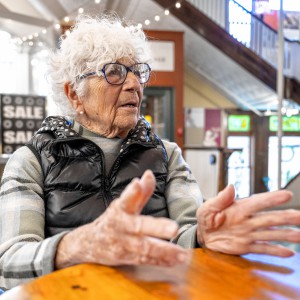 ‘Delightful’ Northampton store shopping guide Jane Hertz, 88, seeking next gig
‘Delightful’ Northampton store shopping guide Jane Hertz, 88, seeking next gig
 Here come the sweetness: Four new businesses prepping to open in downtown Northampton
Here come the sweetness: Four new businesses prepping to open in downtown Northampton
 Local ‘Hands Off!’ standouts planned as part of national effort
Local ‘Hands Off!’ standouts planned as part of national effort
“I started last night making a list of cons and pros for this gravel pit in Granby. When I got to 132 cons, I stopped,” resident Susan Bruffee said.
At that April 1 meeting, an attorney for LJ Development and the firm for the project, Sherman & Frydryk LLC, said that said that while the Orland gravel pit in Granby currently produces material required for septic systems, the pit is nearly depleted. LJ Development wants to open the gravel pit on Trompke Avenue to replace its source of gravel and sand, said attorney Damien D. Berthiaume.
“We’ve heard a lot of opposition from people who live on Bachelor (Street) and other areas in town that have provided what I would describe as very general objections and general oppositions based on environmental concerns,” Berthiaume said. “Any development that is undertaken there, based upon the work performed by Sherman and Frydryck, doesn’t demonstrate any threat to the environment.”
According to both Berthiaume’s presentation and the application, the proposed gravel pit is outside the town Conservation Commission’s jurisdictional wetlands and not near any habitat for endangered species. The applicants filed for a request for determination with the Conservation Commission to ensure the project is outside of its jurisdiction, but the board is holding off on reviewing the mapped area until the special permit might be approved.
Engineer Don Frydryck told the Select Board on Feb. 5 that there would be four monitoring wells throughout the site to monitor the groundwater and water tables, which are between 6 and 12 feet below the maximum evacuation level. Both points were reiterated during the hearing.
“We do intend to have the wetland delineations confirmed at the site,” Frydryck said. “All operations would be outside of the jurisdictional areas of the Conservation Commission, so there’s no work going to be proposed within the buffers or the river’s protection area.”
Berthiaume said his client plans to excavate for 10 months out of the year, averaging production at 186 cubic yards per day. This equates to 10 round trips per day for trucks. One truck will drive on Bachelor Street every 24 minutes, nearly four times longer than the Board of Health’s calculation, which was one truck every 6.5 minutes.
“I would suggest that that is not a significant increase for traffic for a public way,” Berthiaume said. “One more vehicle every half an hour should not be sufficient for the board to find that traffic has increased.”
Berthiaume also addressed concerns about dust and air quality. The trucks traveling to and from the gravel pit will be covered with a tarp to minimize dust, and LJ Development intends to cover and seed the 19-acre plot at the end of the project to create a new field.
LJ Development owner Jason LeFleiur vouched for his equipment’s noise level, saying all the machines abide by the legal limit on a public road. His loader, for instance, produces sound at 85 decibels in the first 1,500 feet from the truck, then drops to 45 decibels thereafter. Granby’s noise bylaw, however, limits residential noise to 65 decibels.
“This is a gravel pit in which I believe the applicant has previously indicated that the equipment being used would likely be a bulldozer, a loader and an excavator. Not significantly different than that would be used in the construction of a single-family house,” Berthiaume said.
Select Board Member Crystal Dufresne remained concerned about the noise based on the bylaw and comments from residents. She asked the applicant to conduct a noise study from the house closest to the pit and from Bachelor Street.
Dufresne and Board Member Richard Beaulieu also discussed whether trucks traveling through or over the 100-year floodplain is prohibited by Granby’s bylaws. According to the law Dufresne read during the hearing, earth cannot be transferred through a floodplain without a special permit granted by the Zoning Board of Appeals. Berthiaume requested time to research the bylaw and brief the board before closing the hearing.
The gravel pit will be discussed again at the Select Board’s May 20 meeting at 6 p.m.
Emilee Klein can be reached at eklein@gazettenet.com.






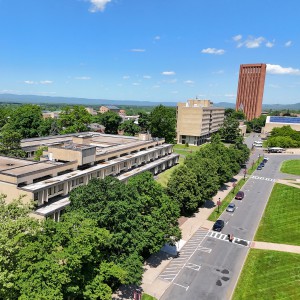 ‘Whole campus’ approach: UMass working to help six students whose visas, status were revoked
‘Whole campus’ approach: UMass working to help six students whose visas, status were revoked  ‘Hands Off’ protest: 5,000 people in half-dozen Hampshire County communities protest against Trump policies
‘Hands Off’ protest: 5,000 people in half-dozen Hampshire County communities protest against Trump policies  Q&A with UMass President Marty Meehan
Q&A with UMass President Marty Meehan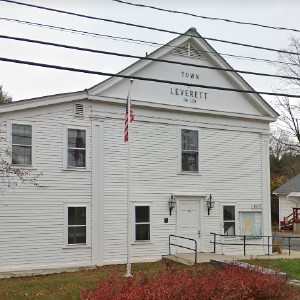 Leverett will consider accepting 147-acre working forest at May’s town meeting; public hearing this Thursday
Leverett will consider accepting 147-acre working forest at May’s town meeting; public hearing this Thursday
